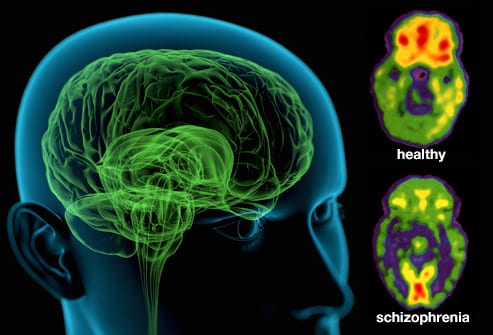Schizophrenia is a disorder that can be confusing.
There can be a stigma attached to just about any mental disorder, such as schizophrenia, that can be not only scary but misunderstood.
Understanding the signs and symptoms of schizophrenia can not only help those who are experiencing it, but it can help those who love and care for someone with it.
But what if you don’t know what you are experiencing? Is it schizophrenia or another disorder?
When you need to get help for any mental disorder, it’s important to acknowledge and recognize there is a problem.
In the beginning, many can write it off as a “mood” or a “feeling”, when in actuality the signs and symptoms are much more severe.
Many feel if you admit you are feeling this way, then you are admitting defeat or that you are “crazy”.
This is not the case. Getting help and recognizing the signs can be the toughest part, but it is crucial for your well-being and getting your life back on track.
Symptoms and signs of schizophrenia can be deceiving, so if you are confused on what to expect or know, this is normal.
Sometimes it can get played off as being stressed or triggered, in a angersome mood, or just feeling “up and down”.
Often times family or loved ones are the first to see the symptoms, and you may not even seem them in yourself.
Episodes may start and you may play it off in the beginning as a one-time thing, but if you start to experience more of these outbursts you need to reach out to someone who can help you or contact a professional as soon as possible.
Recognizing the pattern and wanting to help yourself figure out the underlying issue can have a large impact on your success long-term and in gaining back some regularity of your life.
Schizophrenia is a biological illness that can affect the way a person thinks, feels and acts.
It is a chronic and severe mental disorder, and can be debilitating to those who experience the signs and symptoms.
Although it isn’t common, the symptoms can be severe. A lot of medical research has been done with schizophrenia, and treatment is promising if diagnosed correctly and action is taken.
Before you go diagnosing schizophrenia in yourself, make sure you understand the signs and symptoms of this or other mental disorders.
I’m experiencing some mental disorder symptoms. How would I know it is schizophrenia?
One of the first things people experience with schizophrenia is an altered interpretation of reality.
Hallucinations and delusions can be taking over your thinking and behaviors, and it will generally impair your daily life.
It is noticeable; not just with yourself, but others close to you may recognize you have been impaired or are having some complications.
What if I am in my teenage years, and I feel like I’m just not myself
I hallucinated in class and my friend told me my speech has been weird. What should I be looking for? Am I too young?
Unfortunately, schizophrenia is something that can start in your teenage years, up to the age of 30 (approximately).
Rarely is it diagnosed in someone over age 45. Some symptoms can be seen in children as well.
If you are experiencing delusions, disorganized speech, an impaired ability to function or hallucinations you may have signs of schizophrenia. It would be important to visit a professional as soon as possible for a proper diagnosis.
What are delusions? Hallucinations? Disorganized thinking and speech?
All of these signs are part of the “positive” category symptoms of schizophrenia.
There are two other categories of symptoms as well – “cognitive” and “negative”. We will highlight the positive category symptoms below:
- Delusions are a false belief, not reality. For example, you might think you are being harassed by someone or that something is being directed at you, when in reality it is not. You may also think someone is out to get you, is in love with you, or the car you are in is going to crash when that is not the case. Delusions are an altered sense of reality that no one is experiencing but yourself.
- Hallucinations involve hearing or seeing things that are not real. This could be hearing voices, someone talking to you that isn’t speaking, or anything that involves your senses. Hearing is the most common sense you can feel a hallucination through, but can easily have an affect on your sense of smell, taste, and touch.
- Disorganized speech is another sign that can be prevalent in someone with schizophrenia. They may not be able to talk in a full sentence, or communicate correctly when trying to explain what they are saying or thinking. Asking a question may not involve the entire answer. Your speech may lead to your outward behavior and a lack of focusing, lack of response, constant or jittery movements, or ignoring someone altogether. This is where your inner behavior can be demonstrated through outer behaviors and actions.
Will I experience all of these behaviors all of the time?
No, some symptoms can vary in type and you may not experience all of them. Some symptoms could be worse at certain times, or you may have periods you don’t have signs or symptoms.
There are some that can experience all of the symptoms of schizophrenia all of the time. It varies by person and the severity of their level of schizophrenia. This is why it is important to seek a professional to diagnose these symptoms as soon as possible.
I’ve heard there are three categories of schizophrenia symptoms. Positive, negative and cognitive.
How does this manifest? Would I know what I am experiencing?
Positive symptoms are not the only category of schizophrenia symptoms. There are also negative and cognitive.
Negative symptoms can be deceiving with other mental disorders. Negative signs can be shown through disruptions of normal emotions or behaviors.
A reduction of happiness, verbal communication, hopelessness or a decline in physical activity can be signs of the negative symptoms of schizophrenia. Negative symptoms can often be confused with other mental disorders such as depression, anxiety or anti-social disorders.
Make sure you seek out a professional to understand what you are experiencing more clearly.
Cognitive symptoms are more complicated, and can be very intense or very subtle. You may also be deceived in understanding this as a sign of schizophrenia and not another mental disorder.
Cognitive signs can affect your memory and thought processes. You may not understand someone speaking directly at you. You may be having problems learning, and processing directions.
This too can be easily confused with other mental disorders, so a professional can help outline this as a symptom against other possibilities.
If I don’t get help, will some of these symptoms go away over time?
Unfortunately, symptoms usually get worse over time and will not go away on their own. You may experience swings of ups and downs, but if you do not seek professional help you may become a danger to yourself or society.
It is not accepting defeat or shameful in any way to reach out for help. It is coming to terms with what you are experiencing and realizing the issue so you can move forward with as much normalcy as you can in your life.
Only you can be willing to accept treatment and start this process, no one can do it for you. Recognizing the problem and wanting help can often be the biggest step.
Is the diagnosis hard? What should I expect?
In the diagnosis process, a professional will need to rule out any other mental disorders. Medication and substance abuse can have symptoms as well; so all of this needs to be determined before a diagnosis is ruled.
In the beginning, you should expect a physical exam. After anything is ruled out or there isn’t any other problems, tests would be conducted. During the tests, they may do imaging and/or an MRI or CT scan.
As part of this process, a psychiatric evaluation would also be conducted. This will include observations, determining moods, delusions, hallucinations, any substances being used, and thoughts of violence or suicide.
Also be prepared to discuss your individual and family history with the professional as this may have an impact on your diagnosis.
What does treatment look like? Will I be locked away or are there options?
Treatment will always vary based on the severity of the symptoms. Schizophrenia will require a lifelong treatment plan, even after signs have subsided.
Medications and psychosocial therapy can help manage the condition, and in some cases, hospitalization may be needed.
Medications will be the main treatment of schizophrenia. This can include antipsychotic medications.
The goal with this type of medication is to affect the brain neurotransmitter dopamine and to effectively manage signs and symptoms at the lowest possible dose.
You may also be prescribed an antidepressants or anti-anxiety drugs. Cooperation in treatment and medication is always encouraged; not just for your own well-being but for those around and helping you.
Most individuals with schizophrenia require some form of daily living support, but that can be discussed on a case-by-case basis.
With appropriate treatment, most people with schizophrenia can manage their illness and continue to live a productive life.
Although schizophrenia is rare, it is something that should be properly diagnosed at an early stage.
Cases for this mental disorder are not known, but if you have anyone in your family with a history of schizophrenia this could increase your chances of diagnosis.
Certain factors such as an increased immune system activation, pregnancy and birth complications, or mind-altering drugs during your early adulthood can be causes.
If you think you or some you love may hae signs or symptoms of Schizophrenia, reach out for help.
Give Us a Call- 888-358-8998
Or send us an email- info@newroadstreatment.com
Written by: Melanie Baxendale


